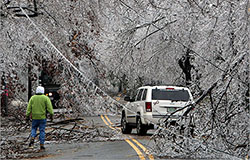BEING PREPARED
Evacuation - Oftentimes, remaining where you are is the most appropriate action following a disaster. Your safety is the most important consideration and ultimately the decision to leave your house is yours to make. In certain circumstances, emergency personnel may call for an evacuation. If you are advised to leave your house, you will directed where you can go for safety and shelter. Many people prefer to plan in advance where they can go, and what routes to take. Remember to bring any emergency supplies you may have already have on hand and to also notify friends and family outside of town that you are safe.
Prepare for 72 Hours - Many people assume that emergency services will be readily available following a major disaster. In truth, our volunteer emergency workers are subject to the same perils and may not be able to help you for quite some time. Also, the scope of any major disaster will initially overwhelm local rescuers and help coming from outside the disaster area will take time to reach you. Stocking up on supplies to be self-sufficient for seventy-two hours is the best way to prepare yourself and your family. Drinking water should be first on your list, plan on one gallon per person per day, at the minimum. Your home water heater will contain several gallons of clean water. Food is the second concern. Many types of dehydrated, dried or canned food is commercially available for storage. First aid supplies and medications should also be stored, along with some basic tools, a fire extinguisher, flashlights, an AM radio with batteries and sanitation needs.
Turning Off Your Utilities - If there has been structural damage to your home, turn off the natural gas supply at the meter to reduce the risk of fire or explosion from a leak. Once the gas is turned off, never turn it back on yourself, wait for your gas company to turn it back on.
Turning off the water supply to your house may prevent trapped water from leaking out, conserving a water source for your use.
Electricity should be turned off at the main breaker panel. Always shut off all the individual circuits before shutting off the main circuit breaker.
LINKS
Red Cross: http://www.redcross.org/services/prepare/0,1082,0_239_,00.html
FEMA: http://www.fema.gov/areyouready/
Disaster preparedness: http://www.ready.gov/
Centers for Disease Control and Prevention: http://www.cdc.gov/
NH Pandemic Influenza Public Health Response Plan: LINK










